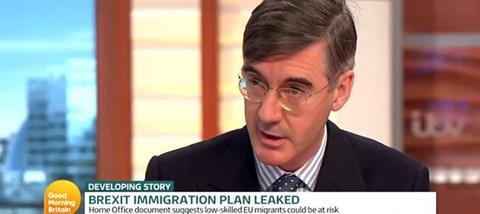
Like many orthodox Christians, I was delighted to see Jacob Rees-Mogg, the Conservative MP for North-East Somerset, witness to his principles and his faith on Good Morning Britain (GMB) yesterday.
Going on the show and being asked by Piers Morgan what he thought about homogenital acts and abortion – inevitable questions for such a public Christian – he maintained that he believed what Christians have always professed about these things, appealing to the sacramental nature of marriage, and the humanity of the unborn child from conception.
It wasn’t merely that Rees-Mogg defended Christian teaching on homosexuality and abortion, a rarity enough on mainstream television, but that he did so with both firm confidence and gentle compassion. He maintained his convictions in the teeth of the dominant and irrational group-think of the political and media establishment, making clear that he did not want to judge any individual, but that he maintained, as a conscientious MP voting in free votes in Parliament, the integrity of his Christian belief.
This witness is valuable, and in marked contrast to the eventual capitulation of Tim Farron on the same issues. We are fortunate that at least one Member of Parliament has the courage, and balanced intelligence, to be able to show real Christian faithfulness.
Partly, as Rees-Mogg pointed out, this is because Tim Farron was leader of the Liberal Democrats, and what the Farron episode showed (as with so many other increasingly in our culture), is that the centre-Left of Anglophone politics is incredibly illiberal and ironically bigoted in its intolerance to anyone with Christian views on sex or the right-to-life.
Yet we see that this bias extends now to all of politics and public life. What the GMB presenters gave to Rees-Mogg was the secular litmus test of two subjects – abortion and homosexuality – that our political and media elite now insist we must have permissive views on in order to be accepted as having a valid voice in the public sphere.
The Times today, claimed that Rees-Mogg’s "views on abortion and gay marriage are out of kilter with modern Britain and the mainstream of the Conservative Party". What they are actually inconsistent with is not "modern Britain", but with the so-called 'liberal' elite at newspapers like The Times who claim to talk for the country, yet only really speak for the socially permissive bubble of people living and working in parts of central London.
It's not since Catholics like Rees-Mogg and myself were subject to the discrimination of the Test Acts of the 17th to 19th centuries that being a practising and orthodox member of the faith has been so apparently exclusionary of the prospect of holding public office. That Rees-Mogg is willing to contradict this, is profoundly encouraging.
As much to be remarked upon as this cheering public expression of orthodox belief however, is the extent to which what Rees-Mogg actually failed to rightly communicate the reasons for the views he sincerely holds. The content of his defence was not what historic Christianity confesses as the grounds for our objections to same-sex marriage, homogenital acts, or abortion. He justified his opposition to same-sex marriage in the grounds that marriage is a sacrament, but the 2013 law never really touched upon sacramental marriage, only the civil institution of it. Catholics and other Christians objected to redefining marriage on the grounds that civil marriage should reflect what marriage is naturally, not as a matter of theology.
Similarly, all he would say about homogenital acts, was that Catholic teaching says we should not judge anyone. This isn’t a good interpretation of the pericope adulterae – which is not about not judging people and actions, but not doing so in hypocrisy – let alone a defence of the Christian doctrine.
With abortion, he was on a much stronger footing. When asked about it, he stated very clearly, "I am completely opposed to abortion. Life begins at the point of conception", and that consequently, "abortion is morally indefensible". Spot on. Yet when presented with the case of a woman who had conceived after rape, he quite remarkably said that "[s]he would have a right under UK law" (this is flatly untrue), with which he wouldn’t interfere as Prime Minister, because "that wouldn’t be the law of the land".
The strength of Jacob Rees-Mogg is his unapologetic authenticity, something appreciated and admired in our postmodern culture. All Christians would do well to learn from his courage, but also to critically consider how better we might express that witness in public ourselves.
Peter D. Williams is a Catholic apologist and author, and a Speaker for Catholic Voices




























